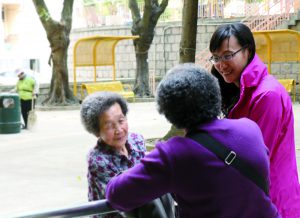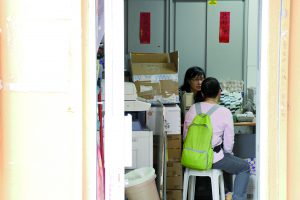Defeated district councillor Rosanda Mok Ka-han plans to shake-up ADPL as new party chair
By Rubie Fan
Last year’s district council elections will be remembered for the success of young newcomers and the felling of political heavyweights. In Sham Shui Po, the veteran Association for Democracy and People’s Livelihood (ADPL) district councillor and legislator Frederick Fung Kin-kee lost his seat to a 25-year-old pro-Beijing candidate who was dubbed a pro-establishment “little flower” by the mainstream media.
Not so far away in Ma Tau Wai, Rosanda Mok Ka-han suffered a similar fate, losing her seat by just 45 votes to a 24-year-old pro-establishment rookie. Ironically, some mainstream media referred to Mok as a “past-it little flower”.
“The residents thought that Mok Ka-han had been the district councillor for a long time and they should let the young people try,” she says. But the 43-year-old is anything but “past it”. Although she was disappointed with the result, she chose to stay in the ADPL and serve her former constituents.
Sitting between stacked up paper boxes, Mok starts counselling two women in her office in Ma Tau Wai Estate, the public housing estate she has served for more than 15 years. Only now, she is doing so as the new chairperson of the ADPL.
 The man she replaced as chairman is her mentor, former district councillor and legislator Bruce Liu Sing-lee. Mok chose to work as Liu’s assistant after graduating from City University because she identified with the ADPL’s motto of helping the needy from the grassroots. She says that as a student she had taken summer jobs working with a “rich political party” that she does not identify by name. “I couldn’t agree with the work of the rich political party. They thought you could make things work with money. But I think there’s a difference between wanting to really serve society and hankering for the status of a councillor. There are things money can’t buy,” she says.
The man she replaced as chairman is her mentor, former district councillor and legislator Bruce Liu Sing-lee. Mok chose to work as Liu’s assistant after graduating from City University because she identified with the ADPL’s motto of helping the needy from the grassroots. She says that as a student she had taken summer jobs working with a “rich political party” that she does not identify by name. “I couldn’t agree with the work of the rich political party. They thought you could make things work with money. But I think there’s a difference between wanting to really serve society and hankering for the status of a councillor. There are things money can’t buy,” she says.
In 1999, Liu encouraged her to contest the Ma Tau Wai seat in the District Council Election. She was 27 when she won on her first attempt. Young female district councillors were a rarity at the time and stereotypes about women were common among councillors.
Some experienced male councillors questioned a woman’s ability to serve the community and thought female councillors treated the work as something to be done in their spare time. On the contrary, Mok found that her identity as a woman and as a mother helped her on some issues.
“A female district councillor has a certain advantage on some women’s issues. You would be more able to view them from a female’s point of view,” she says.
An example is the campaign she fought alongside other district councillors for more comprehensive breastfeeding support facilities around two years ago. Mok points out they were not just advocating for the setting up of nursing rooms but also for support for mothers’ emotional and mental health.
She says some of her male colleagues in the council did not understand the issue. One of them, who is also a university professor, suggested mothers could learn how to breastfeed from YouTube videos and claimed there was not much support for breastfeeding in other countries.
“Mothers sometimes have to sit in a conference room or even the toilet to pump milk. Only women would understand the hard feelings of having to hide away,” Mok says.
Being a woman also makes it easier for her to forge closer relationships with female residents in her constituency. For instance, they may tell her about the problems they encounter as women, about their families and experiences of domestic violence.
As for her own family, Mok’s work as a district councillor meant she could not always put it first. Fortunately, she has had the continuous support of her husband and her parents. Although her parents think being a district councillor is hard work, they have always supported their daughter’s career. Her husband, who is a businessman, also supports her and helps to take care of their children by adopting a flexible work schedule.
“It is important for politicians to get support from their family as there is a tension [between work and family] most of the time and they are always occupied by work,” she says.
Mok says she always respects her family by asking their opinions on different issues – including whether to accept the leadership of the ADPL in January this year. The transition from district councillor to party chair has not been easy.
Mok says she wants to first reposition a party that has always advocated a “talking and fighting” approach – that is communicating with authorities while fighting for social change. It has always been on the moderate end of the pan-democrat spectrum. But Mok thinks the “talking” part of the formula is at a dead end in the current climate. The current government, she says does not want to communicate or negotiate.
“Leung Chun-ying is not going to communicate and he is trying to sow discord [in society]. There is no way to talk now,” she says.
She sees no way out of this situation until there is a new Chief Executive in Hong Kong. So although the ADPL will stick to its relatively moderate approach to politics, a tougher stance can also be expected under Mok’s leadership.
Apart from  repositioning the party, the new chair is also keen to recruit and promote more young people and lower the average age of the ADPL ranks. She thinks it is a trend for members of the younger generation to take the reins in Hong Kong’s political parties.
repositioning the party, the new chair is also keen to recruit and promote more young people and lower the average age of the ADPL ranks. She thinks it is a trend for members of the younger generation to take the reins in Hong Kong’s political parties.
“ADPL has 30 years of history and most people only know its former presidents Frederick Fung Kin-kee and Bruce Liu Sing-lee, who are the seniors from the older generation,” she adds.
Mok describes herself as belonging to the “middle generation” and wants the public to know that the ADPL is not just made up of veterans like Fung, and can help to nurture young politicians. She hopes politicians from her generation can act as a bridge between their seniors and those in the generations below them.
In order to achieve this goal, Mok tries to communicate and hold discussions with the young politicians in the party.
“When we have experienced more, it is always easy for us to ban what the youngsters advocate and ask them to give up on their suggestions. I always ask myself not to do this. This stops youngsters from expressing their opinions,” she says.
She has adopted and used ideas from the younger members, such as spray-painting eye-catching big-character posters to use at protests instead of using traditional banners and petitions.
She has also adopted the idea of raising political issues in the community.
“Many Hong Kong people are slowly-boiling frogs. Many of the values and issues they saw as problematic before, they now think are normal,” she says citing the case of missing bookseller Lee Po.
Mok says incidents like the missing booksellers may be common in the Mainland but are unheard of here. She is afraid that Hong Kong people may come to regard such incidents as normal in 10 years. Therefore, she thinks district councillors should introduce politics into the community and take the lead in discussing policies and injustice with local residents.
For Mok, the key is to avoid making residents feel their situation is hopeless and make them believe things can be changed.
“An outlook of despair is actually very dangerous to society,” she warns.











































